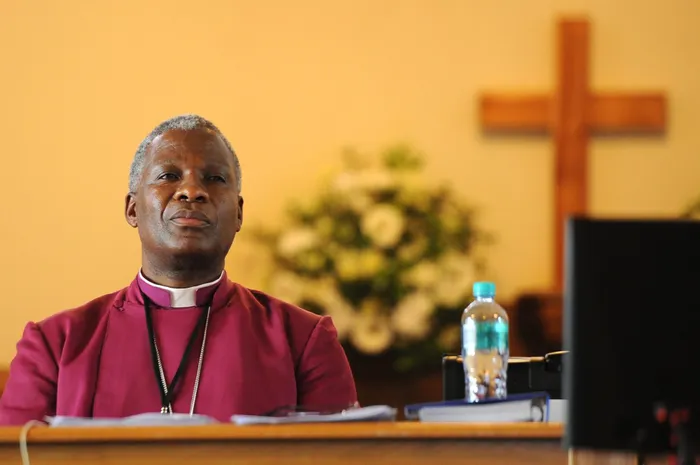Anglican bishops urged to be ‘inclusive’ after rejecting same-sex marriages

Archbishop Thabo Makgoba of the Anglican Church of Southern Africa. Picture: Ayanda Ndamane/ANA
As the Anglican Church in Southern Africa continues to rule out church marriages for same-sex couples, theologians and scholars have warned that justice and love were being sacrificed on the altar of unity within the church.
Anglican bishops in southern Africa ruled out church marriages for same-sex couples at a meeting of the synod, the church’s governing body, last week, where a vote was also taken to craft a set of prayers for couples in same-sex relationships.
Although in the last few decades the church has revised its views on such contentious issues as remarrying divorced people and ordaining women as priests, the issue of same-sex unions remains a divisive one.
Last month, the Church of England voted to offer blessings to same-sex couples, even though clergy members can opt not to use the prayers, and the church still bans same-sex marriage.
According to Professor Sarojini Nadar, the Desmond Tutu Chair in Religion and Social Justice at the University of the Western Cape, the decision by the synod indicated that the church refused to support the desire of the LGBTQIA+ community to have equal access to the benefits that come with committed intimate-partner relationships.
“This fuels stigma, which in turn fuels hatred and bigotry. And so the implications are not straightforward when we think of the alarming violence against queer bodies in South Africa.
“The implications are insidious, and the church has the blood of all the victims of queer hatred on their hands. They cannot and should not be allowed to wash their hands like Pontius Pilate.
“Make no mistake, this isn’t just about marriage equality, and even if it were, the refusal and denial is violent, even if it’s not physical,” said Nadar.
The late Anglican archbishop Desmond Tutu noted that he didn't believe in a “homophobic God”, but still abided by the church’s rules.
“This is a landmark moment and a giant leap which moved the church forward after standing still on the matter for close to a decade,” said Bishop Raphael Hess, chair of the Commission on Human Dignity, referring to the decision to craft special prayers for same-sex couples.
Hess also motivated, on behalf of the commission, for the Anglican clergy who elected it, to be permitted to bless couples in same-sex civil unions.
However, Hess also believed the church should be moving faster towards being inclusive and more generous towards the LGBTQIA+ community.
Retired Anglican priest Chris Ahrends believed the fact that the bishops could not reach consensus on the issue was “just the tip of the iceberg”.
Ahrends also said that generally the church was lost when it came to dealing with sex and sexuality.
“They aren’t even beginning to understand, debate or explore the much more complex issues faced by, for example, transsexual people, intersex persons, or issues like polyamory and the myriad gender-identity issues the younger generations are navigating,” he added.
Ahrends also noted that there was no unanimity on pre-marital sex, masturbation, contraception, the termination of pregnancy, or maternal health rights.
“There’s also no unanimity on what constitutes a marriage, never mind on the acceptance or otherwise of polygamy or couples just ‘living together’ outside of marriage.”
“The conservatives want a box of rights and wrongs. The progressives seek a pilgrimage of exploration,” he added.
He also said the failure by the church to embrace issues of sexuality could also be traced to “patriarchy”, dating back to over 3 000 years ago, to which religion had given the “seal of respectability and authority”.
“There’s nothing more threatening to the patriarchy than people whose understanding of identity doesn’t conform to the strict patriarchal definition of male and female. And the LGBTQIA+ community is exactly that,” added Ahrends.
Reverend Jide Macaulay, a priest based in England and the founder and CEO of House of Rainbow, said theology ignored the reality of the lives of lesbian, gay, bisexual and transgender people.
“Many LGBT people have had to turn to the state for protection rather than rely on the church for protection. It will be callous to ignore the importance of theological changes for same-sex relationships and, indeed, for same-sex marriage in the church,” he said.
Macauley believed there were opportunities for churches in Africa to engage in theological and pastoral listening to the testimonials of LGBT Christians.
“The blatant ignorance and religious violence continue to push many LGBT people and their families to the edge, and eventually outside of the church.
“Needless to say, there are many like myself who have stayed but prepared for the many sacrifices to see inclusion reign in our churches,” he said.
Weekend Argus